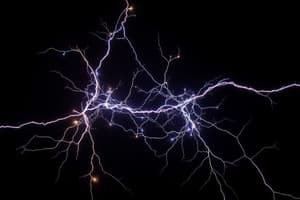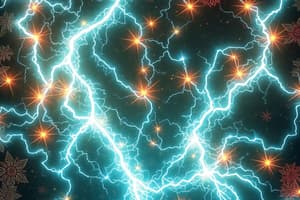Podcast
Questions and Answers
What is the standard unit of measure of electric current?
What is the standard unit of measure of electric current?
Ampere
What type of current reverses direction on a periodic basis?
What type of current reverses direction on a periodic basis?
Alternating current (AC)
What device stores and produces electricity from chemical cells?
What device stores and produces electricity from chemical cells?
Battery
What basic electrical component stores electric charge?
What basic electrical component stores electric charge?
What is a material that allows the free flow of electric charge?
What is a material that allows the free flow of electric charge?
What law describes the electrostatic interaction between charged particles?
What law describes the electrostatic interaction between charged particles?
What electronic component only allows current flow in one direction?
What electronic component only allows current flow in one direction?
What type of current only flows in one direction?
What type of current only flows in one direction?
What is the basic characteristic of matter based on the balance of protons and electrons?
What is the basic characteristic of matter based on the balance of protons and electrons?
What is an electric circuit?
What is an electric circuit?
What is the flow of electric charge through a material called?
What is the flow of electric charge through a material called?
What defines the difference in electrical charge between two points in a circuit?
What defines the difference in electrical charge between two points in a circuit?
What is the interaction between magnetic fields and electric currents called?
What is the interaction between magnetic fields and electric currents called?
What subatomic particle carries electricity by flowing from one atom to the next?
What subatomic particle carries electricity by flowing from one atom to the next?
What is the standard unit of measure for capacitance?
What is the standard unit of measure for capacitance?
What is the standard unit of measure for inductance?
What is the standard unit of measure for inductance?
What basic passive electrical component resists changes in electric current?
What basic passive electrical component resists changes in electric current?
What material does not allow electric charge to flow freely?
What material does not allow electric charge to flow freely?
What is produced by electric currents and magnetic materials?
What is produced by electric currents and magnetic materials?
What is the standard unit of measure for resistance?
What is the standard unit of measure for resistance?
What law describes the relationship between voltage, current, and resistance?
What law describes the relationship between voltage, current, and resistance?
What electronic component prevents the flow of electric current?
What electronic component prevents the flow of electric current?
What type of material behaves between a conductor and an insulator?
What type of material behaves between a conductor and an insulator?
What is the build up of an electric charge on the surface of an object called?
What is the build up of an electric charge on the surface of an object called?
What electrical component transfers electrical energy using inductive coupling?
What electrical component transfers electrical energy using inductive coupling?
What semiconductor device regulates current flow in an electronic circuit?
What semiconductor device regulates current flow in an electronic circuit?
What is the standard unit of measure for electric potential?
What is the standard unit of measure for electric potential?
What is the standard unit of measure used for electric power?
What is the standard unit of measure used for electric power?
Flashcards are hidden until you start studying
Study Notes
Key Terms in Electricity
- Ampere: The standard unit for measuring electric current, often abbreviated as amp.
- Alternating Current (AC): A type of electric current that periodically reverses direction; commonly used in power distribution systems.
- Battery: A device that generates and stores electrical energy through chemical reactions.
- Capacitor: An electrical component that stores energy in the form of an electric charge, consisting of two conductors separated by an insulator.
- Conductor: A material that facilitates the easy flow of electric charge; copper is the primary example.
- Coulomb's Law: Describes the electrostatic force between charged particles, a cornerstone of electromagnetism.
- Diode: An electronic component that allows current to flow in one direction only, crucial for controlling electrical flow.
- Direct Current (DC): Electric current that flows steadily in a single direction, unlike AC.
- Electric Charge: A fundamental property of matter that results from the balance of protons and electrons; measured in coulombs.
- Electric Circuit: A closed loop of electronic components connected by conductive pathways, allowing electric current to flow.
- Electric Current: The movement of electric charge through a conductor; measured in amperes.
- Electric Potential (Voltage): The difference in electric charge between two points in a circuit; measured in volts.
- Electromagnetism: The interaction between electric currents and magnetic fields, fundamental to many electrical devices.
- Electron: A subatomic particle that carries electricity, moving between atoms in conductors.
- Farad: The unit of capacitance, indicating the ability of a capacitor to store an electric charge.
- Henry: The unit of inductance, indicating how much an inductor resists changes in electric current.
- Inductor: A passive component that opposes changes in current flow, typically coiled around a magnetic core.
- Insulator: A material that does not conduct electric current easily, preventing the flow of charge.
- Magnetic Field: The spatial influence around magnets and electric currents, impacting nearby charges and currents.
- Ohm: The standard unit for measuring electrical resistance.
- Ohm's Law: Describes the relationship between voltage (V), current (I), and resistance (R) with the formula V = IR.
- Resistor: An electronic component designed to restrict the flow of electric current.
- Semiconductor: A material that exhibits conductivity between that of conductors and insulators, widely used in electronic devices, with silicon being the most common.
- Static Electricity: The accumulation of electric charge on an object's surface, remaining fixed rather than flowing.
- Transformer: A device that transfers electrical energy between circuits through inductive coupling, used to change voltage levels.
- Transistor: A semiconductor device utilized to control current in an electric circuit, acting as a switch, gate, or amplifier for signals.
- Volt: The standard unit measuring electric potential difference (voltage).
- Watt: The unit for measuring electric power, indicating how much energy is consumed or produced per unit time.
Studying That Suits You
Use AI to generate personalized quizzes and flashcards to suit your learning preferences.




